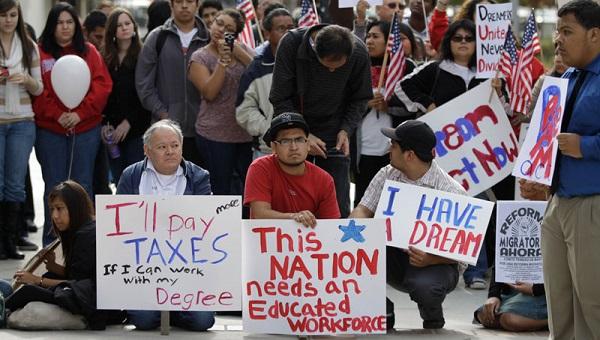For most people, finding a job is as simple as looking in the want ads or walking into a business with a resume in hand. For students who are undocumented, it’s not that easy.
For one thing, undocumented residents don’t have Social Security numbers or tax IDs ”” a requirement for obtaining employment. Furthermore, people have to find out if they even qualify for traditional work where you’re on a standard payroll system.
The Deferred Action for Childhood Arrivals (DACA) allows people who came to the U.S. in a method other than the legal immigration process to apply for a work permit.
“On June 15, 2012, the Secretary of Homeland Security announced that certain people who came to the United States as children and meet several guidelines may request consideration of deferred action for a period of two years, subject to renewal. They are also eligible for work authorization,” the website for the U.S. Department of Immigration explains.
DACA basically means that people who have lived here since before June 15, 2007 would be eligible for employment.
EDUCATION IS A KEY FACTOR
However, Raúl Z. Moreno, coordinator of the Dream Outreach Center at Fresno State, said that the issue of undocumented work and education goes all the way back to 2001.
In 2001, Gov. Grey Davis approved California Assembly Bill 540, which provides students who attended a California high school for at least three years the ability to attend college in California.
The bill was purposefully vague. It doesn’t refer to undocumented students only students. The nonspecific term of student made it so those with undocumented statuses could attend college for the first time.
Those rights were expanded a decade later in 2011.
“[In 2011], AB 130 gave the right to AB 540 students to apply for scholarships,” Moreno said. “AB 131 gave the right to AB 540 students to apply for state financial resources.”
AB 130 and 131, which were both signed into law by Gov. Jerry Brown, are together what is known as the California DREAM Act. DREAM stands for development, relief, and education for alien minors.
Moreno added that about 90 percent of undocumented students who apply for colleges in California will qualify under AB 540.
TYING EDUCATION TO WORK
But what does education have to do with an undocumented student finding work? Not every student will qualify for DACA because they came in after June 15, 2007, but about 90 percent will qualify for AB 540, Moreno said.
Since AB 540 students can go to college ”” including Fresno State, which at the beginning of the spring semester was at 533 undocumented students enrolled ”” they can apply for internships and community service scholarships, Moreno explained.
“It’s totally up to the person who wants to hire them, but I can have a student who comes to me and says ‘I want to do an internship with you ”” I’ll give you 200 hours.’ So that person has 200 hours from me, and I choose to pay his tuition.”
That’s not restricted to Student Affairs and the Dream Outreach Center.
“Most departments do that ”” especially with the totally undocumented ”” the ones who don’t qualify for DACA. Because they cannot be part of the payroll system,” Moreno said. “They can go and be research assistants, lab assistants, they can be office assistants ”” they can be whatever, but they cannot get paid through payroll.”
Moreno explained that it’s essentially like giving someone a scholarship in lieu of paying them a regular paycheck. Students who don’t have work permits can approach departments and negotiate time for scholarships.
This is much more common at the doctoral level ”” which are called fellowships, Moreno said, but anyone could technically do this.
“At the bachelor level, we don’t have it as easy,” Moreno said. “It’s a little more difficult because departments aren’t that creating [of those jobs] yet.”
An issue that arises is that an undergrad wouldn’t “supposedly” be as adept to actually negotiate pay as a doctoral student would, Moreno explained.
In the past, Moreno said there were issues with departments hiring students in this manner despite top-level administration being OK with them doing it.
They used to be “too scared” to do it, but he hasn’t seen many issues with that nowadays. “It’s getting better,” he said.
Moreno said ”” “I even had a visiting professor from UC Riverside who came and said ‘Raúl, I have this student ”” she’s awesome … and I want to help her.’ And I said, ‘Well, what’s holding you back from helping?’ He said, ‘Well, she’s undocumented.’ I said ‘OK, forget that she’s undocumented. Just think ”” she’s a student. What can you do for a student?’ And then he said, ‘Well, there’s really nothing that can hold me back.’”




